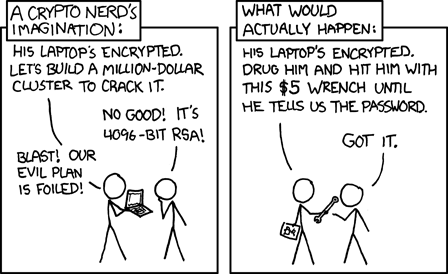I'm currently studying forensics, and one thing that keeps coming up is the authorities breaking into phones.
There are several third party tools they can use, but one of the most popular is 'Cellebrite'.
My understanding of this device was that they could NOT access an encrypted, password protected phone BFU (before first unlock), as long as it was a modern device and the firmware was updated to the most recent version.
But time and time again, the police are able to crack any phone they want. It takes time sometimes, but they get in there eventually.
There was even a case not too long ago where they couldn't easily access the iphone they had seized, so they went to Apple's HQ and Apple unlocked it for them.
I assume Samsung would comply with the police as well.
Not to mention the stack of backdoors or zero day bootrom exploits the intelligence agencies could be sitting on.
So what is the point of encryption in regards to law enforcement, really? If they are getting in either way, why even bother?
How can one ensure their device is 100% (or even 99.9%) protected? Buy a Chinese phone? But then you have to worry about surveillance from China. Not to mentioned the hardware exploits that could be used.
Extending this to computers, what is the point of even having things like VeraCrypt or Bitlocker exist if the government can go to the manufacturer and get them to crack it open? If they can utilize zero days and hardware and bios exploits every time?

